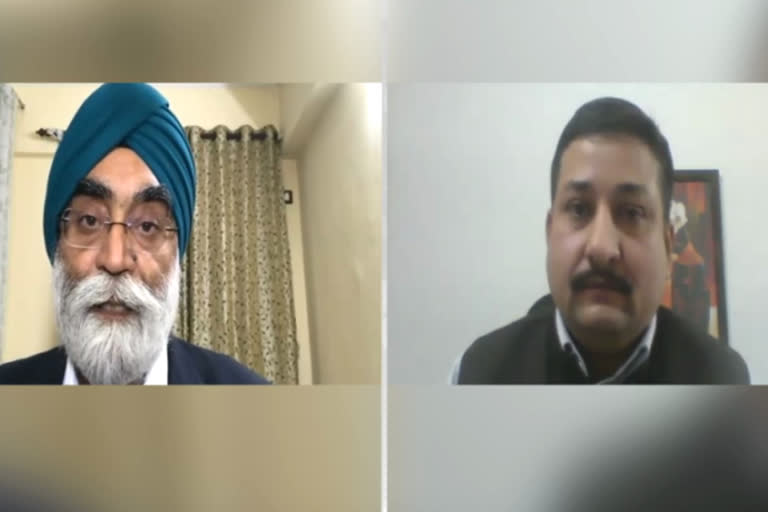New Delhi: Prime Minister Narendra Modi’s government may need to borrow directly from the Reserve Bank of India by the end of the current financial year to monetise the ballooning fiscal deficit which is expected to touch 6-7% of the country’s GDP this year due to the unprecedented situation caused by the Covid-19 global pandemic, said a top economist.
In her budget estimate, the finance minister Nirmala Sitharaman estimated the fiscal deficit to be Rs 7.96 lakh crore, 3.5% of the GDP for the FY 2020-21.
However, the outbreak of Covid-19 global pandemic which has killed over 1,50,000 people in the country and over 1.8 million people worldwide, severely crippled the revenue collection at a time when the government needs to spend more on welfare programmes and give concessions to the industry for the economic revival.
The unprecedented situation forced the government to increase its borrowing for the fiscal by 50%, from the budget estimate of nearly Rs 8 lakh crore to Rs 12 lakh crore.
Dr Charan Singh, Chief Executive of Delhi-NCR based policy think tank EGROW Foundation, says the government needs to borrow for its welfare programme and other expenditures.
“It was borrowing earlier as well but this time I believe that the government may have to borrow from the Reserve Bank of India,” said Charan Singh.
“It is called monetised deficit. There is nothing wrong in it,” he told ETV Bharat.
Dr Charan Singh, who previously worked with the International Monetary Fund as a senior economist and the Reserve Bank of India as the research director in the economic policy and debt management department, says the government should not shy away from borrowing directly from the RBI.
“Even if the government has to resort to a monetised deficit to fill in the gap, it should not be shy,” said the economist.
“I think this is where they may have to go as the year comes to a close,” Dr Singh noted.
Monetised deficit will not cause inflation
The economist also rejects the fear that any decision by the Centre will lead to inflationary pressures in the economy.
In its monetary policy committee meeting held in December, the RBI governor Shaktikanta Das observed that price pressures have been spreading as CPI inflation increased sharply to 7.3% in September and further to 7.6% in October 2020.
“A lot of hue and cry is being made in the normal times that if you borrow from the Central Bank of the country, it's inflationary. I've always asked in which country it was inflationary,” asks Dr Charan Singh.
“If you look at the 2008 crisis, the balance sheets of the central banks of the US, England, Europe expanded three-to-four times but inflation did not take place,” he added.
Unprecedented Union Budget
Dr Charan Singh says the upcoming Union budget will be unprecedented in many ways as the outbreak of Covid-19 global pandemic poses a very difficult challenge from the point of view of public finances.
“1918 Spanish Flu also lasted 18 months. People need to be supported through subsidies, medicines, health, food etc at a time when there is hardly any tax collection."
India’s economy contracted by nearly 24% in the first quarter and by 7.5% in the second quarter and according to the RBI, the economy may contract by up to 10% in the current fiscal.
It severely dented the Centre’s finances as for the first eight months of this fiscal, the net tax collection to the Centre was just Rs 6.88 lakh crore against the budget estimate of over Rs 16 lakh crore for the fiscal.
Dr Charan Singh says the economic growth is low, revenue receipts are not coming in but the expenditure is going up constantly.
“Making a budget is not easy in such a situation,” he told ETV Bharat, adding that it is a big challenge for the finance minister how to revive the economy as no one knows when the normalcy will return.
“Given the uncertainty in India, in the world, it is going to be a unique budget in which the FM will have to put all her energy to revive the economy,” he observed.
Escape clause already used
The Covid-19 global pandemic is not the only problem for the finance minister. Indian economy was already slowing down for the last two years even before the outbreak of Covid-19, which forced the finance minister to invoke the escape clause recommended by NK Singh Committee.
In 2017, NK Singh Committee recommended a half a percent deviation from the fiscal deficit target for a year during a difficult period with the condition that the government should clearly lay down the road map for returning to the path of fiscal consolidation.
Charan Singh says in such a situation, the budget deficit rules should not apply, neither to India, nor to the rest of the world.
“Those countries who invented the rule of fiscal deficit at 3% of the GDP and 60% debt to GDP ratio, they have already waived it. No one in the western world is even talking about it,” Dr Singh told ETV Bharat.
(Article by Krishnanand Tripathi)



